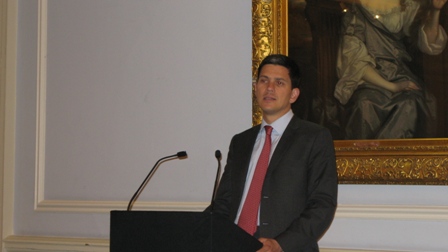| In conversation with David Miliband |

|

|

|
| Features | |
| Thursday, 26 August 2010 | |
|
David Miliband has reaffirmed his commitment to build a strong UK China relationship during his fight for the Labour leadership. His conversation with representatives of the British Chinese community this week was reassuring despite lacking concrete policy commitments.
Having started his speech with the standard Labour attack on the coalition government’s budget and cuts, Mr Miliband’s artfully hooked it back to the focus of the gathering by saying “UK’ challenge is that none of these policies can be perused without understanding the international context.”
His frequent trips to China as the former foreign minister allowed him to speak on the two countries’ mutual challenge in encouraging entrepreneurship, reducing carbon emissions, advancing human rights and increasing cultural exchange in an experienced and convincing manner.
“I believe we have to build an economy where how you make money is just as important as how much you make,” he said.
“Creating a strong government that gives more is the best way to encourage businesses to give more, and this is something both the UK and China need to work on to drive forward the world economy after the financial crisis.
“The over 80,000 Chinese students in Britain is a fantastic thing for our country”. But as well as making Britain more inclusive by tackling the problem of inequality, he also stressed the importance of tackling sustainability.
“China should do what’s consistent with its economic growth. Britain has committed itself to cut emission by 60% but the fact is that our emission only consists of 1.5% of the world’s total. We need to work with China in an international drive under a common set of commitment to tackle the problem together.”
The opinions and principles that Mr Miliband spoke about were consistent with those he once advocated as the foreign minister. He also refrained from sensitive topics such as the attack on David Cameron citing China as a nuclear threat back at election time.
But it is slightly disappointing that Mr Miliband devoted so little time explaining how “he will work closely with the [British Chinese] community to ensure their voice is heard” as is suggested by the event description. For many Chinese who consider Britain their home, the pressing issues of giving confidence to the next generation, securing legal identity for many migrants, having a say in politics and being correctly portrayed by the western media are of much more immediate concern, as is reflected by the questions raised by the audience.
It is very well for Mr Miliband to say “we need to forge links with the Chinese community in Britain by engaging more widely in the community” and praise Chinese for Labour for having changed, broadened and strengthened debates in the party. But when asked by the managing director of Chinese Catering Solutions how he proposes to solve the problem of labour shortage and bring back the training scheme previously available to Chinese chefs, he revealed his ignorance for the issue by admitting that he did not know that the scheme has stopped.
Perhaps what Mr Miliband did give is a sense of security by showing that he cares and is willing to humbly engage with the community. He comforted a worried mother that her talented daughter will be able to receive good education despite the current pressure on education intake. He showed sympathy towards a staff at BBC World Service and reassured him that funding cuts will not be targeted at any individual or groups.
For a community that has so little influence on the results of the Labour leadership contest, and therefore has received little attention from British politicians historically, what Mr Miliband has given is encouraging. Perhaps the gathering was no place to discuss any policies in detail, but at least Mr Miliband demonstrated a positive attitude which can lead to good discussions on specific issues in the future.
As the gathering was drawing to a close, Chair of Chinese for Labour Sonny Leong presented Mr Miliband with a pledge asking for his commitment to help the Chinese community if elected as the new leader. The exact wordings of the ledge are:
“As leader of the Labour Party, I will
“have bi-annual meetings with representatives from the Chinese community and work with Chinese for Labour to ensure that its voice is heard.
“endeavour to build a broad and deep Chinese representation starting in local government and then getting candidates to run for winnable seats in Westminster elections.
“ensure that members of the Chinese community are properly and publicly recognised for their contributions.”
Perhaps this pledge will have more impact than Mr Miliband’s speech. To sign a document promising to work closely with Chinese for Labour, and hence singling out the Chinese from other ethnic minority groups, is an action requiring much consideration from a potential party leader. The presence of representatives from the Chinese Embassy, the media and members of the community means that actions are expected of him in the future.
What would this mean? Having a leader of opposition who fully recognises the importance of China in the world and who is keen to closely engage with the Chinese community in Britain brings hope for positive changes. The growing power of China and the increasing presence of Chinese in Britain are starting to bring issues facing the once silent community into mainstream political discussions.
Cecily Liu
A copy of the signed pledge: David Miliband changed "bi-annual" meeting to "annual" meeting at the scene |
|








